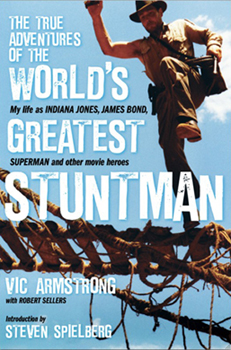 Last week, Titan Books sent over an exclusive excerpt of Vic Armstrong’s autobiography, The True Adventures of the World’s Greatest Stuntman.
Last week, Titan Books sent over an exclusive excerpt of Vic Armstrong’s autobiography, The True Adventures of the World’s Greatest Stuntman.
Now, I have a stack of books to review — including the Johnny Depp one I promised some weeks back — but I thought hey, I’ll put down that one and get through a little of Armstrong. It had quite a bit of interest from CHUD readers, and I thought I owed everyone a fast turnaround.
Would you believe I tore through this book in a single night?
That’s the kind of helter-skelter, breathless, fun, and intimate book this is. It seems clear Armstrong probably dictated this book more than wrote it, and if you’re looking for smooth prose, you’ll be frustrated. But one shouldn’t be looking for that kind of book if you’re looking for the true adventures of a stuntman. You want a ballsy, relaxed, “and that’s what we did” voice, and Armstrong offers it in spades. It feels like you’re sitting and having a beer with this guy, and he says “Say, want to hear about what it was like on Indiana Jones and the Temple of Doom?” It feels less like reading and more like listening, and it’s just a blast.
Armstrong’s book should appeal to a lot of film fans. There’s lots of technical details which should delight the how-to types, but there’s plenty of gossip, wacky location stories, frank discussions of how deals are made, and how films fall apart. Those looking for ugly and sordid stories will have to find them elsewhere, as Armstrong has kind words to say about everyone. The stories about Harrison Ford, Will Smith, Tom Cruise, Paul Verhoven, and Arnold Schwarzenegger immediately made me feel guilty about lobbing any criticism (particularly about their paychecks) in their direction. In fact, as I read it I began to scoff — “Well, you still work for them, of course you’re nice, they’re very powerful!” — the next story would find him being brutally honest about films that didn’t work, actors who were nasty to him, actors who were untalented, and directors who were morons. He’s always quite polite about it, but he doesn’t mince words. (His small observation about the difference between Raiders Steven Spielberg and War of the Worlds Spielberg is one such moment. It’s not negative, but it is surprising.)
As the book wears on, Armstrong begins peppering in little asides that reminded me of Drew Struzan’s book as he reflects — sometimes positively, but usually a bit wistfully — on a changing industry. CGI is as much of a gift to stuntmen and stunt coordinators as it is a curse, and it’s fitting that the book ends on a question mark of The Amazing Spider-Man, a film that (in Armstrong’s own words) is rejecting CG Spidey in favor of practical stunts. The industry seems caught up in a moment where they’re rediscovering that practical and digital can go hand-in-hand, and result in a better film, and Armstrong seems to be poised to jump on whatever Hollywood throws at him next, preferably if it comes with horses, explosions, and speeding cars. (But not helicopters.)
The World’s Greatest Stuntman is really an enjoyable read for any fan of movies, particularly those with lots of explosions and mayhem. Reading about the broken bones and concussions will make you appreciate every single one of them more; reading about the exotic locations and boozy afterparties will just make you long to have a job this exciting and unusual. Turning these pages is likely to be as close as many of us will get.
You can buy The World’s Greatest Stuntman at Amazon.com or B&N.com or whatever your preferred outlet might be.